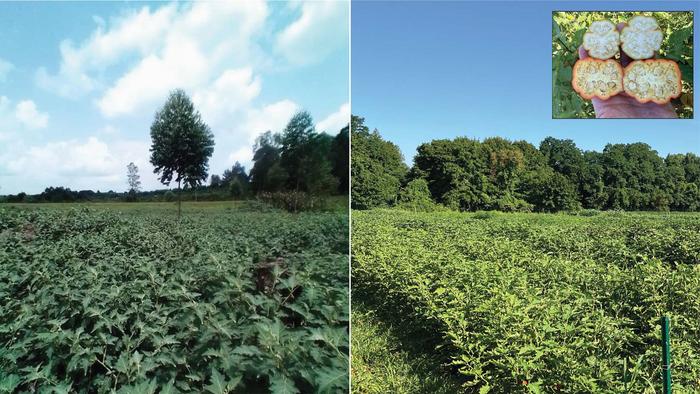
In a significant breakthrough for agricultural science and genetic research, a group of scientists led by Cold Spring Harbor Laboratory (CSHL) has made strides in understanding plant genetics through a novel approach they call “pan-genetics.” This transformative methodology allows researchers to analyze complete genomes within the Solanaceae family, which includes vital crops such as tomatoes, potatoes, and eggplants. The implications of this research extend far beyond traditional breeding methods, promising to enhance food diversity and resilience against adverse conditions like drought and disease.
The current agricultural landscape is heavily reliant on a limited variety of plants, with 75% of the world’s food derived from just a dozen species. However, scientists estimate that around 30,000 species are edible, highlighting the untapped potential for crop diversification. The researchers at CSHL are tackling the inherent challenges in breeding by delving into the complex realm of paralog genes—genes that emerge through a process called gene duplication. Understanding these paralogs could redefine our approach to genome editing and trait selection in crops, enabling breeders to create more resilient varieties.
The CSHL team, collaborating with scientists across the globe, has successfully sequenced a multitude of complete genomes from various plants in the Solanaceae family. By developing a high-quality pan-genome, they have established a comprehensive framework to map the genes associated with essential agricultural traits. Through this intricate mapping, they can target specific genes to engineer desirable mutations, expanding the genetic toolkit available to breeders seeking to enhance crop performance.
Professor Zachary Lippman, a leading figure in this groundbreaking research, emphasizes the importance of this work by questioning how many potential food crops remain underappreciated in the eye of science compared to major players like corn and soybeans. His insights shed light on the need to redirect focus towards lesser-known yet significant crops that could thrive under new agricultural practices informed by advanced genetics.
The research team identified African eggplant, a relative of tomatoes indigenous to sub-Saharan Africa, as a key subject in their study. Notably, African eggplant exhibits a vast diversity in fruit characteristics such as shape, color, and size, making it an ideal candidate for exploring genetic variations. By examining the genetic makeup of this plant alongside more commonly studied species, researchers can uncover critical genetic switches that lead to important agronomic traits.
One of the most remarkable outcomes of this collaborative effort is the discovery of a previously unknown gene linked to fruit size in African eggplant. The team’s analysis, which included mapping tens of thousands of paralogs, revealed that this gene performs a similar function in tomatoes as well. By precisely editing this gene, the researchers demonstrated their ability to influence the size of tomato fruits, a breakthrough that opens new avenues for improving crop traits through targeted genetic modifications.
Additionally, the researchers emphasized the value of reciprocal exchanges between indigenous crops and major crops. This synergistic approach fosters innovative breeding strategies, creating predictable pathways toward enhancing crop diversity. By merging knowledge and techniques from diverse agricultural contexts, the team exemplifies how integrating varying methodologies can propel advancements in plant genetics.
In a broader context, crop diversity is essential not just for improving food supply but also for enhancing nutritional quality, consumer choices, and overall health. Professor Lippman notes the pressing need to comprehend how related paralogs function—this understanding can lead to optimizing crop yields and blooming timelines, directly benefiting farmers and consumers alike.
With every new discovery, the potential to impact global food systems becomes increasingly evident. As these scientific advancements unfold, they could pave the way for solutions to challenges posed by climate change and population pressures. The possibility of nurturing a broader range of crops could lead to a more resilient agricultural ecosystem, less vulnerable to the threats of pests, diseases, and changing climate conditions.
Moreover, the findings from this study have high relevance in the context of food security. As different regions experience the ramifications of ecological changes, developing crops that can withstand such transformations becomes imperative. By leveraging genetic knowledge across species, especially those less explored like African eggplant, farmers can cultivate crops tailored to their specific environmental challenges.
In conclusion, the innovative work conducted by CSHL researchers signifies a pivotal moment in plant genetics and agricultural science. Their exploration of pan-genetics and paralog genes sets the stage for groundbreaking developments in crop engineering. This research not only contributes to the body of scientific knowledge but also has the potential to redefine future agricultural practices, ensuring a stable, diverse, and nutritious food supply for generations to come.
Subject of Research: Pan-genetics in agricultural species, focusing on African eggplant and its relation to tomatoes and other crops.
Article Title: Solanum pan-genetics reveals paralogues as contingencies in crop engineering.
News Publication Date: 5-Mar-2025.
Web References: 10.1038/s41586-025-08619-6a.
References: None provided.
Image Credits: Lippman lab/CSHL.
Keywords
Genetic methods, food security, genome mapping, plant genetics, plant genomes, genome editing, targeted genome editing.
Tags: agricultural biotechnology advancementsagricultural challenges and solutionscrop diversity and resilienceCSHL pan-genome researchenhancing food varietyfood security and genetic researchgene duplication and paralog genesgenome editing in agricultureglobal collaboration in plant scienceinnovative breeding methodsSolanaceae family geneticstomatoes potatoes eggplants genetic study





